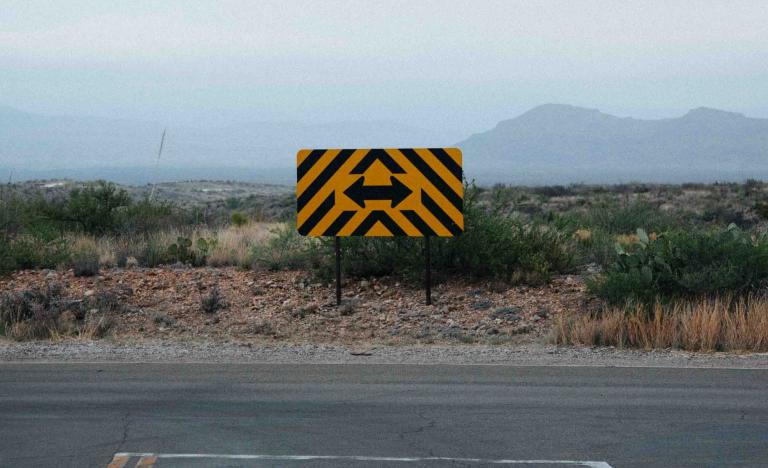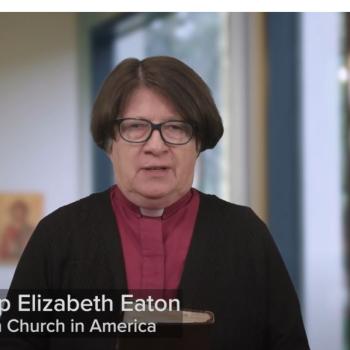Clergy face serious challenges in preaching during this post-election season. Whether they serve a red, blue, or “purple” congregation, they are likely facing confusion, tension, and even anger from members whose emotions are on edge. In the protracted ballot-counting process and the interregnum (the period between the election and the inauguration) pastors can find themselves fielding harsh words and conflict in the church. Here are some ideas for messaging and preaching in the post-election season — whether your church leans left, right, or hovers in the middle.

Every Vote is Sacred
It’s important to remind people that all votes must be counted – even if the winner is apparent. Every vote represents the voice of a child of God who is sacred to their Creator. Thus, every vote is sacred and must be counted.
What about accusations of fraud, “fake” ballots, or other disinformation?
It can be frustrating when someone repeats misinformation about fraudulent ballots. Whether or not their accusations are unfounded, their fears are real. You might respond: “If I thought there were illegal things going on with the ballots, I would feel that way, too. We want this to be a free and fair election.” Then remind them that they can report concerns to the US Election Assistance Commission via their hotline number (1-866-552-0004), email address ([email protected]), or their online complaint form: https://www.eac.gov/inspector-general/report-fraud-waste-or-abuse.
Also, if they’re aware of voter intimidation that took place, or intimidation of election officials that is going on, they can contact the ACLU by calling 1-866-OUR-VOTE, or visiting https://www.aclu.org/know-your-rights/voting-rights/.
Remind them that we’re setting precedent in this election by what happens in the days and weeks ahead. We need to be mindful that what we do now will have an impact on future elections. “Do unto others as you would have done unto you” means we count all votes just as you want your vote counted.
The Positive News
The interregnum will be fraught with questions, a swirl of emotions, and the potential for unrest, chaos, and even violence. Clergy can help calm the anxiety of their congregations by staying composed and resolved. [Looking for ideas for how to keep yourself centered in mind, body, and spirit? Read: Clergy: Prepare for Post-Election Season in Mind, Body & Spirit]. There are good things that have happened and that are currently happening. And we’ve learned important lessons from this election.
Here are reassurances you should repeat often.
- Everything is proceeding as it should in a democracy. Our democracy is working the way it’s designed to function.
- We’ve learned that we can vote in a pandemic.
- We’ve learned that the threats of violence did not materialize to the degree that was feared, thanks be to God.
- We learned that people came together in really positive ways to encourage each other while voting.
- Clergy and congregations supported the democratic process in myriad ways, from phone-banking to working the polls, to registering voters, to handing out drinks and food for people waiting in line.
The Difficult News

Despite the good news, however, there are also some hard truths we need to face.
- Some people tried (and continue to try) to disrupt the democratic process.
- Voter suppression was a key factor in this election, as it has been for decades.
- There are some who believe that not all votes should be counted – especially the votes of black and brown people.
- Our nation is deeply divided because of racism and white supremacy.
- Intimidation and threats of violence are ongoing. They could escalate at any time.
- We have a long road ahead in this country for dismantling disinformation, racism, hatred, fear, and inequity.
- Not all clergy and congregations stepped up. Some were silent. Some contributed to the negativity and divisions.
Disinformation is continuing.
Social media platforms have allowed disinformation to propagate on their sites. They are not being held accountable. This breaks the commandment not to bear false witness, and the church needs to call this out. Lying and falsities ruin relationships and destroy how we function as a democracy.
At the highest levels of government, the past four years have seen a normalizing of lying, cheating, gaslighting, criminality, cruelty, and systematic dismantling of social norms and governmental accountability. A precedent has been established that future leaders may take advantage of unless serious protections are codified.
The bottom line is that church must take a role in re-establishing ethical norms based on honesty, trust, and accountability.
At the same time, Christianity in America is going to need a come-to-Jesus process to interrogate our white supremacist foundations. [Recommended read: White Too Long: The Legacy of White Supremacy in American Christianity by Robert P. Jones. https://www.amazon.com/White-Too-Long-Supremacy-Christianity/dp/1982122862/]
With these difficult realities in mind, here are some ways to approach preaching during the Sundays of the interregnum.
Foundations for Preaching in the Post-Election Season
Sermons in a “blue” church
If you serve a congregation made up primarily of progressive Christians, here are some possible approaches to preaching in the post-election season:
- While we breathe a sigh of relief the apparent results, the interregnum still calls for vigilance, patience, and staying the course.
- Be prepared – get your oil ready and trim your wicks (Matt. 25:1-13). This means both having the spiritual, emotional, and physical energy, and also not “burning out” from a wick that’s burning too hot and too fast.
- The ugly truth is obvious – we are a nation bitterly divided.
- White, racist nationalism was very close to winning this election – this is unacceptable.
- Consider the parable of the ten bridesmaids (Matt. 25:1-13) from the perspective of privilege. White folks need to recognize the privilege of being able to “sleep” without worry. BIPOC do not have that luxury. It’s time for white folks to wake up. As Rev. Dr. William Barber says, “What good is it being ‘woke’ if you don’t get out of the bed?”
- In Amos Chapter 5, God’s words are harsh but necessary: “I despise your festivals . . . Let justice roll down like stream” (Amos 5:18-24). We cannot celebrate this election the way we had hoped we could. The “blue wave” did not come. So, things cannot go “back to normal.” We have much work to do to dismantle racist, xenophobic, misogynistic, homophobic, transphobic, and economic structures that are dividing this country.
The church MUST tell the truth about the part it has played in either fomenting, ignoring, or being silent about racism and the other isms structured into our society and institutions.
Joshua’s challenge to the Israelites as they entered a new phase of their life in community together is a challenge to us as well: “Choose this day who you will serve” (Josh. 24:15). Which God are we truly worshiping? The god of wealth, privilege, and whiteness? The god of power, control, and dominance? Or the God who commands us to care for the orphan, widow, foreigner, the planet, and “the least of these”?
Overall, the function of a sermon in a “blue” church is to galvanize the congregation for preparing, asking tough questions, interrogating their privilege (if they’re a white congregation), and recalibrating their faith-in-action for the coming weeks and years.
Sermons in a “purple” or “red” church

If you serve in a purple or red church, you’ll want to take a different approach than that of your colleagues who serve more progressive congregations. The function of this sermon is to calm and steady the congregation while naming and framing difficult truths. Here are some things you might say in a post-election sermon:
- Some people are angry, while some are relieved at the apparent results of the election. How do we listen deeply to the fears – and hopes – of those who are reacting to this election?
- The ugly truth is obvious – we are a nation bitterly divided. (Notice this is a point that is the same for churches in either red, blue, or purple zones.)
- In Matthew Chapter 5, Jesus instructs his followers: “So when you are offering your gift at the altar, if you remember that your brother or sister has something against you, leave your gift there before the altar and go; first be reconciled to your brother or sister, and then come and offer your gift” (Matt. 5:23-24). What does reconciliation look like given our divided society?
Reconciliation is a process that takes sustained work
Reconciliation cannot happen without a process of confession (acknowledgement of harm), forgiveness, commitment to doing and being better, and a system of accountability to ensure that things improve. Only then can seeds of trust be planted and blossom.
- “Choose this day who you will serve” (Josh. 24:15). Which God are we truly worshiping? (Note, this is the same for both sermon approaches. But rather than take a strongly prophetic stance, you may need to leave this as an open question for the listeners to ponder in their hearts. Follow up with individual conversations, Bible studies, and future sermons.)
- This is a time for deep introspection for everyone. Who is God calling us to be?
- We trust in God’s presence in the midst of this difficult time. God’s Spirit creates hope through faith. “Optimism is that things will get better. Hope is the faith that, together, we can make things better. It takes courage to have hope” (From Rabbi Jonathan Sacks, The Dignity of Difference).
Theology matters, no matter what “color” your church!
At its core, preaching in the post-election season is no different than any other season. Whether your church is blue, red, or purple — theology matters!
Emphasize who God is and what God does
- In any text we’re preaching during the post-election season, we must root ourselves in biblical and theological principles.
- What does the biblical text tell us about the nature and actions of God? Who is God and what does God do in the midst of our divided country, culture, and church?
- What is the truth we need to hear about the crucified and risen Christ? How does this confront us with our brokenness and sin – but also surprise us with grace?
- How is the Holy Spirit working within us, among us, and around us to wake us up, open our eyes, put our feet on the ground, stretch our hands to the task, and extend our hearts to our neighbors?
Now we know
When preaching in the post-election season, no matter the results, there are incontrovertible truths we must recognize. Now we know why our siblings of color were not shocked by the election results four years ago. They knew. They’ve always known. This is who America is: divided between goodness and depravity. For the rest of us, there is no denying it now.
In a prayer vigil with clergy colleagues the morning after the election, my colleague Lauren Grubaugh, read to us Luke 8:17: “For nothing is hidden that will not be disclosed, nor is anything secret that will not become known and come to light.”
Here’s what has come to light: the racism, the cruelty, the heartlessness, the gutting of American education, the unholy marriage of white nationalism with politics, the rise of QAnon. This is where we are.
So these words in the next verse, Luke 8:18a are vital now: “Then pay attention to how you listen . . .”
Yes, preacher, pay attention to how you listen when preaching in the post-election season. Yes, Christian, pay attention to how you listen in the post-election season. Pay attention to the filters you use. Pay attention to who you choose to listen to. And pay attention to how you listen to God calling us, perhaps even demanding us to see what has come into the light – and what we’re going to do about it.
Thanks to Faith in Public Life, my colleagues in the Clergy Emergency League, and my lectionary study colleagues in Lexington, Kentucky, for contributing ideas for this post.
Read also:
Ideas for Clergy Dealing with Pre-Election Stress
Election Resources for Faith Leaders: Defend Democracy and Resist Tyranny
What to Do When Parishioners Leave – Because of Politics

Leah D. Schade is the Assistant Professor of Preaching and Worship at Lexington Theological Seminary in Kentucky and ordained in the ELCA. Dr. Schade does not speak for LTS or the ELCA; her opinions are her own. She is the author of Preaching in the Purple Zone: Ministry in the Red-Blue Divide (Rowman & Littlefield, 2019) and Creation-Crisis Preaching: Ecology, Theology, and the Pulpit (Chalice Press, 2015). She is the co-editor of Rooted and Rising: Voices of Courage in a Time of Climate Crisis (Rowman & Littlefield, 2019). Her latest book, co-written with Jerry Sumney is Apocalypse When?: A Guide to Interpreting and Preaching Apocalyptic Texts (Wipf & Stock, 2020).
Leah is also co-founder of the Clergy Emergency League, a grassroots network of clergy that provides support, accountability, resources, and networking for clergy to prophetically minister in their congregations and the public square in this time of political upheaval, social unrest, and partisan division.
Twitter: @LeahSchade
Facebook: https://www.facebook.com/LeahDSchade/













